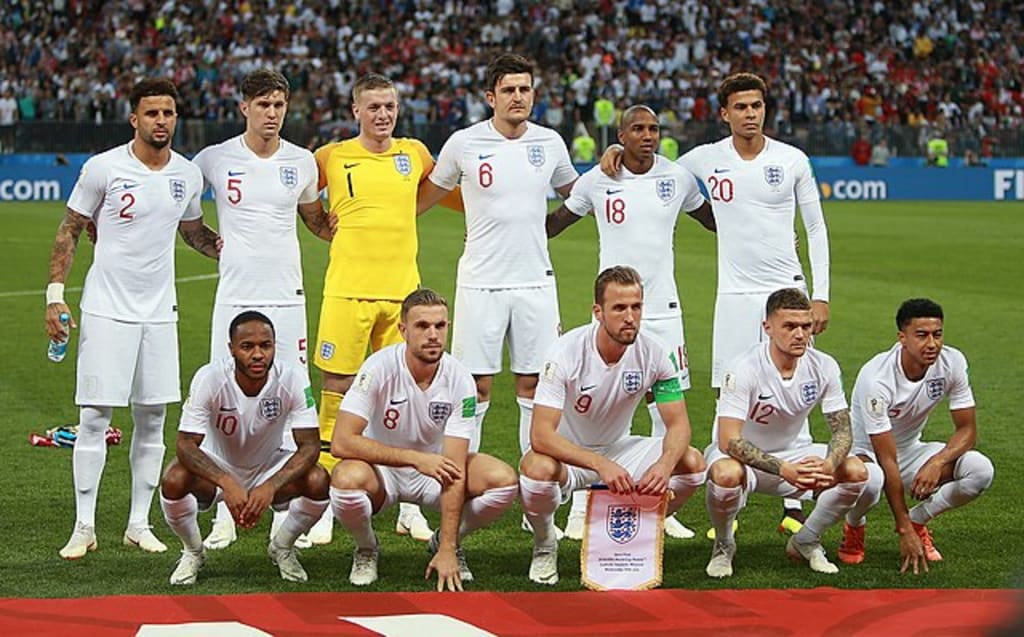England Vs Germany: Much More Than A Game Of Football
Nothing captures England's history of imperial pomp, postcolonial melancholia and angst, better than this fixture.

A few months ago, two longstanding epic foes went to war. This time, it wasn't waged in the trenches of Flanders and Somme, nor was it fought in the deserts of Torbruk and El Alamein or in the thick forests of Zamfara and Sambisa. On this occasion, it was in the gentrified, cosmopolitan surroundings of North-West London - Wembley, an erstwhile working class neighbourhood, which has had hundreds of millions of pounds pumped into it, thereby sanitizing it, of its demography, history and identity.
The enemies in question?
England and Germany.
A football match between these two countries has always meant more than 22 men running around the pitch, with one nation seeking to dominate the other over the course of ninety minutes or in the case of these two, in 1990 and 1996, one hundred and twenty minutes, at the end of which the Germans triumphed. It has always been about history, bloody history, which has helped shaped the course of the humankind, in the bloodiest period that humanity has ever known - the twentieth century.
Historical Antecedents.
To England, Germany was something of an upstart, a younger sibling with too many ideas above its station, a sibling who simply didn't know its place and one with an aggressive, expansionist and militaristic mindset, intent on capturing for itself, huge amounts of space for its aggrandizement and one, definitely fixated on the prizes that the older sibling had claimed for itself, on its travels around the globe.
Germany's mindset was always going to set it on collision course with its self-regarding, accomplished and equally ambitious sibling and it didn't matter that Kaiser Wilhelm II was Queen Victoria's first grandchild, nor did it matter that Prince Albert, the prince consort, was German. Stepping out of one's bounds was an act of war and the younger sibling needed to be taught a lesson of a lifetime in electing to covet that which wasn't his.
This "sibling rivalry" ended up being played out on the global stage - in what became known as the "Great War", that was fought in disparate corners of the globe, England, given its imperial might, was able to summon its subjects from far flung corners and with the aid of the newly discovered commodity - oil - it was able to comprehensively defeat its sibling.
For daring to go head to head with its sibling, not only did Germany have to pay huge sums in compensation, but it also did lose its treasured possessions throughout the African continent. Namibia, Togo, Cameroon, Chad, Central African Republic, Gabon, Rwanda, Tanzania and Burundi had to be ceded to the victors of the war.
Desperately unhappy at its treatment by France and England, Germany starts to rearm, but does so by stealth, intelligence reports getting to Winston Churchill -once a rising star, who was undone by his hubris and several missteps, in the Liberal and Conservative parties - indicate that the vanquished sibling might be up to no good, yet again.
Perhaps out of guilt and sympathy, the older siblings treat the younger with kid gloves and elected not to pursue their compensation with any conviction.
This decision by England and France, allied to the new lover in Germany's life, one who was something of a femme fatale and one who seemed adept at pressing its buttons, somewhat obsessively, urging Germany to rediscover its former self.
Germany, by now, dangerously in love with National Socialism, was keen to do all that it could to impress its lover and given in to its whims and caprices. This obsessive love found great expression in the annexation of the assets of its neighbours.
England, who had been given assurances by its younger sibling that no theft would ever occur, had it hands forced and it had no choice but to go to war a second time.
The Second World War And The Beginning of The End Of Empire.
Barely recovered from its bruising war with its sibling, twenty years earlier, England was hopelessly, perilously unprepared for the sequel to the family drama. And like the previous drama, it ended up dragging other siblings from around the globe, forcing close relatives, near and afar to take sides.
However devastatingly attractive and seductive, Germany's femme fatale lover was, it had a huge problem getting the right family members on board, very few seemed to like her - most importantly, the cousin across the Atlantic.
Over the years, the cousin across the Atlantic had overcome its inauspicious start to life, survived its early setbacks and had become fabulously wealthy. It had considerable leverage and was in a position to orchestrate outcomes most favourable to its interests.
England, at this point, in its history, was extraordinarily vulnerable, its siblings had succumbed to Germany and it stood alone, defenseless and broke.
It was at this point that the wealthy cousin across the Atlantic - The United States of America -stepped into the family conflict, providing immense support to its former role model and to mention its biggest hero, thus tipping the odds, rather decisively in England's favour, in its war against its militaristic sibling.
To prevent a recurrence of war from the upstart sibling, America and Britain, with their unruly and unsophisticated distant relative - Russia, got together with new arrangements of dividing the family spoils of war.
England, by now was fully exhausted. Its children from across the various continents were now clamouring for autonomy. They had come to see England in a way that they had never seen England before; warts and all. These children - India, Ghana, Malaysia, Nigeria, who by now had become grown adults had come to England's rescue. And along with the wealthy cousin from the Atlantic, helped liberate Germany from the grips of its dangerous lover.
This realization that these conscious adults were fiercely determined to break free and live their lives on their own terms, without interference, drove England into a deep depression, which was exacerbated by a serious drinking problem, that it had developed over the years.
And for a while, it seemed that England, whose self esteem, was inextricably intertwined to its wealth and its children across the globe, whom it had treated quite appallingly, we must never forget, was going through a major identity crisis, an existential angst, from which, most people thought that it would never recover.
Germany Reinvented.
Germany, by now, cowed by its crushing and humbling defeat, abandoned his femme fatale, renounced violence and militarism and began to take steps towards respectability.
The wealthy cousin from across the Atlantic, buoyed by the part that it had played in defeating Germany, kept a number of its troops in bases around the country and lent it money to kick start the process of reinvention.
Given the scale of devastation wrought by the family drama, most people gave the Germans, a much longer time to recover. And yet again, they took people by surprise in getting back on its feet by the 1950s.
Along with France, it had set up the European Economic Commission, the EEC, which would later be known as the European Union, the EU. Through this new format, Germany had begun to reconcile with former foes and chart a new course.
Its success wasn't restricted to the political and economic arena, its football team was making huge strides, starting with the world cup win in 1954.
England Vs Germany 1966–1996.
England and Germany's history, which played out in intense sibling rivalry over imperial conquests in Africa and Asia, two global wars, which led to tens of millions lives lost, gave way to something totally different, but equally compelling and just as breathtaking - association football.
England had invented football, in its imperial pomp and just as it expanded its territories and markets across the globe, England took the game with it. When you think of the likes of Newell's old boys, Corinthians, AC Milan, FC Barcelona, it's pertinent to point out that these Argentinian, Brazilian, Italian and Spanish clubs were set up by travelling Englishmen.
When the World cup began in the early twentieth century, England chose not to send a team to compete, because it thought that the concept wouldn't take hold.
But England was wrong, the FIFA world cup began in 1930, which was won by Uruguay and further competitions in 1934 and 1938 took place, which Italy won, back to back,
Owing to the second world war, no competition took place until 1950 in Brazil, which Uruguay won for a second time. Germany took the 1954 edition, followed by consecutive wins by the Kings of Samba - Brazil.
FIFA, In selecting England to host the 1966 world cup, L'angleterre was presented with a once in lifetime opportunity to win the most prestigious competition of a game, that it had invented in the nineteenth century.
England got through their group stages easily and faced tough opposition in their quarter and semi final matches against Argentina and Portugal, winning narrowly, setting the stage for the final match with Germany.
Given the strong memories of the second world war, the English saw it as much more than football - it was a do or die affair.
After 90 minutes, the scores were level and it was in extra time, that England got two goals, one contentious and one perfectly legal, thus handing victory to England over Germany.
To millions of Englishmen across the country, it felt like 1940, all over again, winning this football match, helped them reassert a false sense of superiority, something that they had lost since the disintegration of Empire across Asia and Africa.
By 1970, the tables were turned, England were trounced by Germany and in 1974 and 1978, failed to qualify for the world cup.
England's nadir in international football, coincided with with a precipitous decline in its economic fortunes, it was forced to beg IMF for a loan to shore up its reserves, there was talk of a military coup and for a brief period, had to turn off the lights three days a week.
Germany on the other hand in 1974, won the world cup, won the European championships in 1972 and 1980.
In football as well as in economics and industrial productivity, Germany was wiping the floor with England. And for those who remember the war, this wasn't a good look at all.
By the time, the countries met at the 1990 world cup held in Italy, Margaret Thatcher had been prime minister for over ten years, England had shaken off a bit of its post colonial melancholia and it took the game to the Germans, desperately unfortunate to lose at penalties.
England Vs Germany, 1990 via YouTube
England didn't qualify for the world cup, held in America, in 1994. German excellence and efficiency was starting to decline a bit, but that didn't stop them from getting to the last eight of USA '94, losing to Bulgaria.
At the next European championships due to be held in England, both countries would get the opportunity to rekindle their on the pitch, given that it was the first match of any consequence since the 1966 final at Wembley, English nationalism and Jingoism was in huge supply and there was absolutely no subtlety from the English about it.
And just like six years earlier in Turin, the match ended 1–1, thus leading to extra time and penalties, which, as you guessed correctly, England lost. What made 1996 very difficult to swallow was that Germany went on to win the competition in England, of all places, for the very third time.
The intervening years haven't necessarily been kind to England. Even though it defeated Germany at the 2000 championships, it turned out to be a meaningless victory as neither team qualified from their group.
Both teams were seeded in the same group for the 2002 world cup qualifiers, which afforded England the opportunity to avenge the defeat at Wembley and inflict on their rivals, the highest ever defeat on home soil, for a very long time.
At the 2010 world cup held in Africa, for the very first time, in the round of 16, England found themselves being horrifically eviscerated by a ruthless, resurgent German team, which would go on to win the 2014 edition held in Brazil.
The match played on Tuesday, resulted in a rare knock out round victory for England, it will have meant nothing, if it's unable to go all the way to the final and win its first international title in fifty-five years.
The history of England and Germany is a tale of greed, genocide and globalism; one that has contributed immensely to humanity and one that's brought our civilization to its very knees.
England versus Germany, has always been much more than football. How else could you possibly describe it?
Thanks very much for reading.
About the Creator
Adebayo Adeniran
A lifelong bibliophile, who seeks to unleash his energy on a number of subjects






Comments
There are no comments for this story
Be the first to respond and start the conversation.